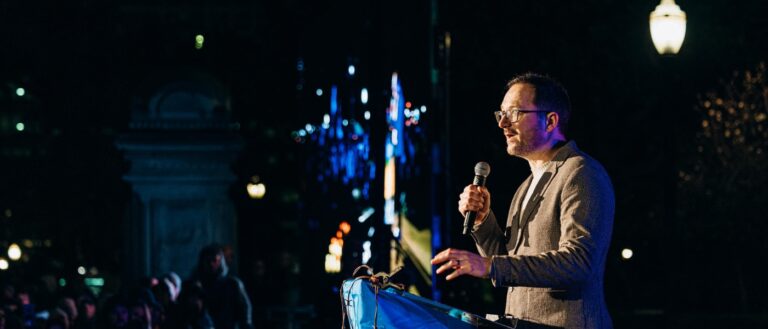A day before Russia launched its full-scale invasion of Ukraine, Roman Sheremeta boarded one of the last flights out of Kyiv. At that time, the native Ukrainian and associate professor of economics at Case Western Reserve University’s Weatherhead School of Management still didn’t believe war would start.

Soon after his flight landed in the United States, Sheremeta learned Russian troops had surrounded the ex-Soviet nation on three fronts—and fired missiles on several locations near the capital.
Now more than a year into the invasion, Ukranians have not only withstood Russia’s attack but have recaptured 50% of the territory Russia seized while depleting 150,000 of Russia’s troops, 3,000 tanks, and hundreds of planes and helicopters.
As many Ukranians took up arms to defend their country, Sheremeta rose to action in his own way—including officially launching a university in Kyiv amidst the war and serving on an economic advisory board to Ukrainian President Volodymyr Zelenskyy.
A beacon of light
Sheremeta was born in Ivano-Frankivsk, a city in western Ukraine, and still has family in the country. Now, more than ever, he wants to support the place where he spent the first 20 years of his life.
Sheremeta began work toward this long-held dream before the war began; his trip to Ukraine was to help launch American University Kyiv, of which he’s founding rector (essentially its top academic official).
Though Russia’s invasion upended the university’s timeline, it still got off the ground and is now the first university in Ukraine developed in line with higher education accreditation standards from the United States.
American University Kyiv saw its first batch of 152 students enroll in September, and leaders hope to reach 500 students by fall 2023.
“At this stage, I want to dedicate a significant part of my life to Ukraine and to help rebuild the country,” said Sheremeta, who is on a leave of absence from CWRU. “Besides building a great institution in Ukraine, it’s very symbolic and a beacon of light.”
University courses are taught fully in English—an important point for many Ukrainians like Sheremeta, who were taught Ukrainian and Russian in school but are now eager to get away from the heritage of the Soviet Union by transitioning to Ukrainian and English.
“If we truly want Ukraine to be a … fully developed country economically, we need to build the leaders of the future,” Sheremeta noted. “That’s exactly what we’re doing.”
A persevering spirit
When Sheremeta returned to Kyiv in 2022 after it was liberated from Russia, he said “it was a pretty desperate place.” Many people left, the streets were empty and there were roadblocks everywhere. He said you could feel the tension in the air.
In the months to follow, however, people got used to their new normal, because, as Sheremeta put it, “life goes on.”
“You have the same traffic jams, people doing business as usual, running errands, all of the shops are running, streets are full of people,” he said. “The one thing that reminds you they’re still at war in Kyiv, specifically, is from time to time you get air raid sirens, which reminds you the rockets are flying.
“Russia has been bombing Ukrainian cities, not military structures,” he continued. “They’re trying to make life miserable for Ukranians.”
This is nothing new for Sheremeta’s 94-year-old grandmother, unfortunately, who has maintained her residence in Ivano-Frankivsk throughout the war. When Sheremeta visited her a few weeks ago, she told him she has “survived Hitler, lived through Stalin’s repressions, and we will survive Putin as well.”
“It’s a general view of pretty much all Ukrainian people that they are not going to give up,” Sheremeta said. “That’s the way they see it—they’re going to win no matter what. They’re fighting for their independence. Ukrainians are the main heroes of the story.”

A helping hand
Before the war started, Sheremeta began serving in an executive board role with Ukrainian American House, a nonprofit aimed at building an effective partnership between Ukraine and the U.S.; when the war began, the organization started collecting humanitarian aid—and has helped to deliver aid worth more than $10 million so far.
“I delivered [aid items] myself quite a few times,” Sheremeta said. “I’ve delivered even to the front lines to the soldiers. At one point in time … we had to hide in a military shelter with the soldiers. We were delivering their medical equipment and tourniquets.”
Sheremeta is not only helping those on the front lines. He’s also on an economic council for recovery for Ukraine, which is an advisory board to President Zelenskyy. He was contacted to be a part of the council because of his Forbes’ recognition that named him one of the “Top Economic Thinkers of Ukrainian descent.”
As for the future of his home country, Sheremeta is not only hopeful—he’s very optimistic.
“Ukraine will win this war, and the world will come together to build Ukraine—and build it better, stronger,” he said. “A strong Ukraine means security in the world.”


